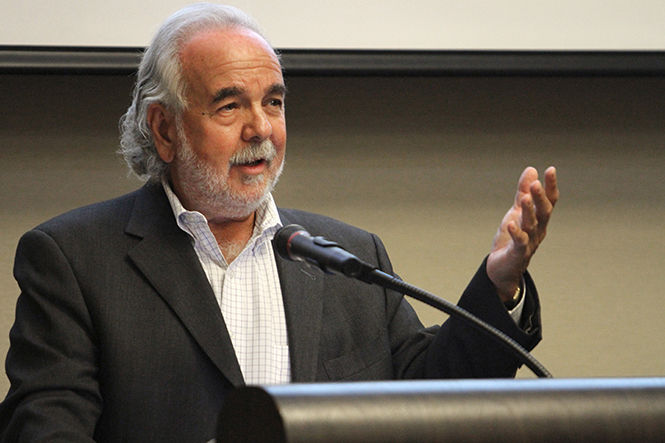Conference explores future of Jewish learning
Speaker Peter Geffen gives background information about the teachings of Rabbi Abraham Joshua Heschel during the Jewish Academic Conference Sunday, Sept. 14, 2014 at the Kent Hotel and Conference Center.
September 14, 2014
Scholars and academics exchanged their views about the future of Jewish education Sunday night at the 26th Annual Midwest Jewish Studies Association Academic Conference.
Chaya Kessler, director of the Jewish Studies program at Kent State, directed the conference, which began Sunday at 10:30 a.m. Sessions were held at the Wick Poetry Center and the Kent State University Hotel and Conference Center.
Kent State’s Jewish Studies program will celebrate its 40th anniversary this year, so it’s an opportune time for the school to host such a distinguished conference.
“The number 40 has great significance,” Kessler said. “It represents a transition or a change.”
Keynote speaker Peter Geffen, the founder of the Abraham Joshua Heschel School in New York City and a recipient of the Covenant Award for excellence in Jewish Education, spoke about Abraham Joshua Heschel, a leading Jewish theologian during the Civil Rights Movement, who promoted change during the 1960s.
Heschel wanted to adjust the perspective of Judaism and have his community understand the importance of being intercultural.
“The education offered in most Jewish schools is insipid, flat and trivial,” Geffen read from one of Heschel’s unpublished works.
Heschel influenced the direction of Jewish education in the 1960s, and now, scholars from across the globe plan to continue to transform their programs to better suit students.
Lea Ganor from Haifa University in Israel, who attended the event Sunday night, said she hopes to bring a new point of view about the Holocaust to America.
“The state of Israel was established despite the Holocaust, not because of the Holocaust,” Ganor said. “After such a trauma, we would expect the Jewish people to be broken and powerless. This is the opposite; they build a country.”
American Jewish studies focus more on the Hebrew language while Israeli Jewish studies focus on Israel itself, Ganor said.
One common teaching between the two nations is the Holocaust, and Ganor hopes that Jewish studies programs in America will look at how the state of Israel affects this part of history.
Ganor will be speaking at the conference Monday in the McGilvrey Room at the Kent State University Hotel and Conference Center.
Sol Factor, a professor in the department of history at Kent State, plans to implement what he learned from the conference in the classroom.
Earlier in the day, he viewed a film called “The Quarrel” at a presentation by Michael Dickerman from Richard Stockton College of New Jersey. “The Quarrel” is about two friends who survived the Holocaust and reconnect after the war.
“The idea of using a film like ‘The Quarrel’ would be very interesting,” Factor said.
Kent State president Beverly Warren was at the conference and welcomed those in attendance to Kent State.
“I know in Jewish tradition names have meaning, and I want you to have Kent State University’s meaning as that university that still holds high the ideals of respect for diversity and of moving forward as a powerful community to fight for what’s right,” Warren said in her welcome speech.
While Kent State is the current site for the conference, Mara Cohen Ioannides, President of the Midwest Jewish Studies Association, announced the location of next year’s conference will be the University of Kansas.
The conference will continue through Monday and will close with an optional tour of the May 4th memorial.
Contact Haley Keding at [email protected].












